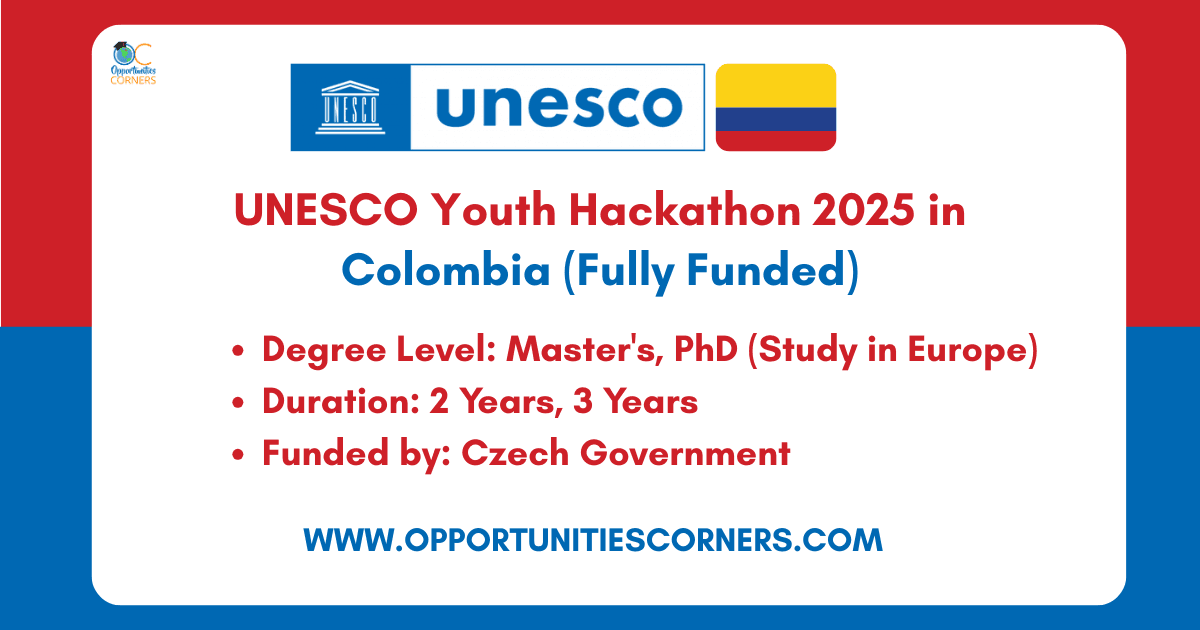UNESCO Youth Hackathon 2025 in Colombia (Fully Funded)

UNESCO Youth Hackathon 2025 to be Held in Colombia, Offers Fully Funded Opportunity
Applications are now being accepted for the UNESCO Youth Hackathon 2025, a fully funded event scheduled to take place in Cartagena, Colombia, from October 23-24, 2025. The hackathon aims to gather young innovators from across the globe to collaborate on solutions addressing critical challenges in the digital information landscape, including the proliferation of misinformation, online hate speech, and the ethical implications of Artificial Intelligence (AI).
Addressing Digital Challenges Through Youth Innovation
The UNESCO Youth Hackathon, a flagship initiative of UNESCO’s Global Media and Information Literacy (MIL) Week, provides a platform for young people to develop and share innovative ideas to combat pressing issues in the digital age. In 2024, UNESCO hosted 202 teams in Indonesia. Winning teams from the hackathon will be invited to present their projects at the Global MIL Week Conference in Cartagena, with UNESCO covering all flight and accommodation expenses.
Event Details:
Host Country: Colombia Location: Cartagena Duration: 2 Days Dates: October 23-24, 2025 Benefits: Fully Funded (Round Airfare Tickets & Accommodation) Deadline: September 1st, 2025
Financial Support and Program Theme
UNESCO will provide round-trip airfare and accommodation for selected participants. The overarching theme for the 2025 hackathon is "Youth Leading the Way: Building MIL Solutions for Impact." This theme emphasizes the crucial role young people play in shaping a more informed and responsible digital future.
Program Structure:
Selected participants will receive free online mentoring prior to submitting their ideas. Applicants will submit projects and proposals via the UNESCO website. Winning teams will be invited to Colombia to present their projects at the Global MIL Week Conference.
Focus Areas for Innovation
Participants are encouraged to develop projects within the following focus areas:
AI and MIL: Innovative solutions addressing challenges posed by AI through MIL. MIL Education: Creative approaches to MIL learning in the digital age. Community Impact: MIL-based interventions that empower communities. Youth Engagement: Strategies to position youth organizations as MIL change agents. Open Track: Other MIL-related ideas aligned with this year’s theme.
The hackathon welcomes diverse project categories, including games, applications/websites, radio programs/podcasts, artistic works (comics, short videos, documentaries), educational toolkits, youth organization campaigns, community-based interventions, and other creative modalities.
Eligibility Criteria
The UNESCO Youth Hackathon 2025 is open to candidates from all countries, with the following eligibility criteria:
Team Size: 3 to 6 members per team (national, regional, or international). Age Requirement: All team members must be between 18 and 30 years old. Diversity Encouraged: Gender balance and inclusivity are highly encouraged. Experience Not Required: Passion and motivation are the primary requirements.
Expert Perspective on Media and Information Literacy
Dr. Anya Sharma, a professor of Media Studies at the University of California, Berkeley, emphasizes the importance of MIL initiatives like the UNESCO Youth Hackathon. "In an era defined by information overload and the rapid evolution of digital technologies, media and information literacy is no longer a luxury but a necessity," Dr. Sharma states. "These programs empower young people to critically analyze information, identify misinformation, and become responsible digital citizens. The hackathon format encourages collaboration and innovation, leading to impactful solutions that can address real-world challenges."
Historical Context and Current Relevance
The focus on MIL has grown significantly in recent years, driven by concerns about the spread of fake news and the manipulation of public opinion. Historically, media literacy efforts focused primarily on traditional media like newspapers and television. However, the rise of the internet and social media has necessitated a broader approach that encompasses digital platforms and online content. UNESCO's Global MIL Week and related initiatives like the Youth Hackathon play a crucial role in promoting critical thinking and responsible online behavior globally.
Analytical Viewpoint on the Hackathon's Potential Impact
According to a report by the Institute for the Future, initiatives like the UNESCO Youth Hackathon can have a significant impact on fostering a more informed and engaged citizenry. The report highlights that "by empowering young people with the skills and knowledge to navigate the digital information landscape, we can build more resilient communities and promote democratic values." The hackathon's focus on collaborative problem-solving and innovative solutions aligns with the Institute's recommendations for addressing the challenges of the digital age.
How to Apply
Interested applicants must submit an online application through the UNESCO website. The deadline for applications is September 1st, 2025.
Originally sourced from: Opportunities Corners
